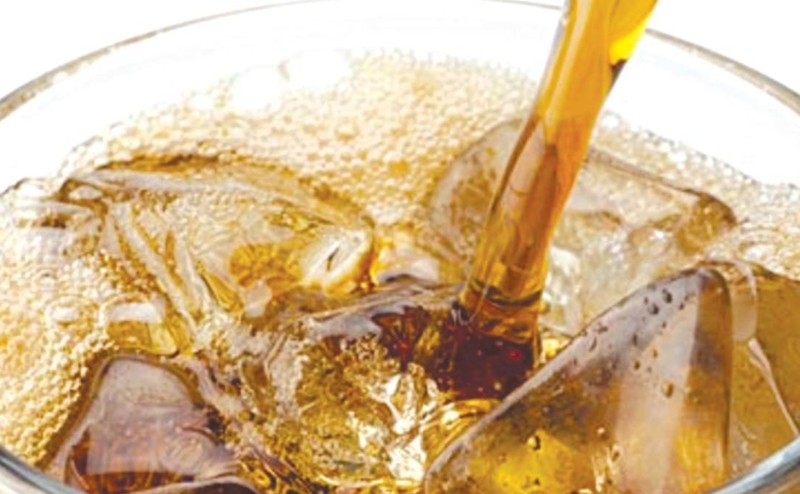Researchers have shown that adults who have at least one diet drink a day are three times more at risk from a stroke or dementia.
Scientists say they should no longer be regarded as the healthier alternative and urge the public to stick to water or milk. Their study of almost 4,400 adults also suggests diet drinks are more likely to cause strokes and dementia than those full of sugar. There was no link between sugary beverages and either of the illnesses – although the researchers aren’t encouraging us to drink them either.
The team of scientists from Boston University believe the artificial sweeteners including aspartame and saccharine maybe affecting the blood vessels, eventually triggering strokes and dementia.
Diet drinks account for a quarter of the sweetened beverages market but there is growing evidence they are not as healthy as previously thought.A major review in January by Imperial College London researchers found they were no better at aiding weight loss than full fat drinks.
In fact the authors suggested they were encouraging obesity by triggering the sugar receptors in the brain, making us crave sweet food.In this latest study – published in the American Heart Association’s journal Stroke – researchers looked at 4,372 adults over the age of 45.
They had filled in detailed questionnaires on their food and drink intake in the 1990s and were then tracked for ten years. The results showed that adults who had one or more diet drink a day were 2.9 times more likely to develop dementia and three times more at risk of strokes compared to those who virtually none at all.
Matthew Pase, senior fellow in the department of neurology at Boston University School of Medicine, said: “Our study shows a need to put more research into this area given how often people drink artificially sweetened beverages.
“Although we did not find an association between stroke or dementia and the consumption of sugary drinks, this certainly does not mean they are a healthy option.“We recommend that people drink water on a regular basis instead of sugary or artificially sweetened beverages.”
Even if someone is three times as likely to develop stroke or dementia, it is by no means a certain fate.“In our study, three percent of the people had a new stroke and five percent developed dementia, so we’re still talking about a small number of people developing either stroke or dementia.”
Rachel Johnson, past chairwoman of the American Heart Association’s Nutrition Committee and professor of nutrition at the University of Vermont, said: “We know that limiting added sugars is an important strategy to support good nutrition and healthy body weights, and until we know more, people should use artificially sweetened drinks cautiously.
“They may have a role for people with diabetes and in weight loss, but we encourage people to drink water, low-fat milk or other beverages without added sweeteners.”The researchers are still not sure whether diet drinks are causing strokes or dementia – or whether those who consume them are at higher risk anyway. Previous studies have shown they tend to be consumed by adults who are already overweight or obese.
Meanwhile, data from the Framingham Heart Study (FHS) has shown that people who more frequently consume sugary beverages such as sodas and fruit juices are more likely to have poorer memory, smaller overall brain volumes and smaller hippocampal volumes – an area of the brain important for memory. Researchers also found that people who drank diet soda daily were almost three times as likely to develop stroke and dementia when compared to those who did not consume diet soda.
These findings appear separately in the journals Alzheimer’s & Dementia and the journal Stroke.“Our findings indicate an association between higher sugary beverage intake and brain atrophy, including lower brain volume and poorer memory,” explained corresponding author Matthew Pase, PhD, fellow in the department of neurology at Boston University School of Medicine (BUSM) and investigator at the FHS.”
“We also found that people drinking diet soda daily were almost three times as likely to develop stroke and dementia. This included a higher risk of ischemic stroke, where blood vessels in the brain become obstructed and Alzheimer’s disease dementia, the most common form of dementia,” he said.
Excess sugar is known to have adverse effects on health. Diet soft drinks are often touted as a healthier alternative to regular soda. However both sugar and artificially-sweetened beverage consumption has been linked to cardiometabolic risk factors, which increases the risk of cerebrovascular disease and dementia.
In these studies approximately 4,000 participants over the age of 30 from the community-based FHS were examined using Magnetic Resonance Imaging (MRI) and cognitive testing to measure the relationship between beverage intake and brain volumes as well as thinking and memory. The researchers then monitored 2,888 participants age 45 and over for the development of a stroke and 1,484 participants age 60 and older for dementia for 10 years.
The researchers point out that preexisting conditions such as cardiovascular disease, diabetes and high blood pressure did not completely explain their findings. For example, people who more frequently consumed diet soda were also more likely to be diabetic, which is thought to increase the risk of dementia. However, even after excluding diabetics from the study, diet soda consumption was still associated with the risk of dementia.
Although the researchers suggest that people should be cautious about regularly consuming either diet sodas or sugary beverages, it is premature to say their observations represent cause and effect. Future studies are needed to test whether giving people artificial sweeteners causes adverse effects on the brain.
Guardian
This page has been viewed 482 times
Tags : Editors choice






























